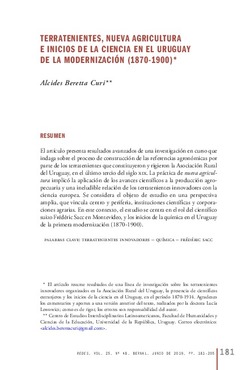Terratenientes, nueva agricultura e inicios de la ciencia en el Uruguay de la modernización (1870-1900)
Landowners, new agriculture and the beginning of science in the modernization of Uruguay (1870-1900)

Ver/
Fecha
2019-06Autor
Beretta Curi, AlcidesResumen
El artículo presenta resultados avanzados de una investigación en curso que indaga sobre el proceso de construcción de las referencias agronómicas por parte de los terratenientes que constituyeron y rigieron la Asociación Rural del Uruguay, en el último tercio del siglo XIX. La práctica de nueva agricultura implicó la aplicación de los avances científicos a la producción agropecuaria y una ineludible relación de los terratenientes innovadores con la ciencia europea. Se considera el objeto de estudio en una perspectiva amplia, que vincula centro y periferia, instituciones científicas y corporaciones agrarias. En este contexto, el estudio se centra en el rol del científico suizo Frédéric Sacc en Montevideo, y los inicios de la química en el Uruguay de la primera modernización (1870-1900). The article presents advanced results of an ongoing research that investigates the process of construction of agronomic references by the landowners who formed and governed the Rural Association of Uruguay (ARU), in the last third of the 19th century. Making new agriculture implied the application of scientific advances to agricultural production and an inescapable relationship of innovative landowners with European science. It considers the object of study in a broad perspective, linking center and periphery, scientific institutions and agrarian corporations. In this context, the study focuses on the role of the Swiss scientist Frédéric Sacc in Montevideo, and the beginnings of Chemistry in Uruguay of the first modernization (1870-1900).
